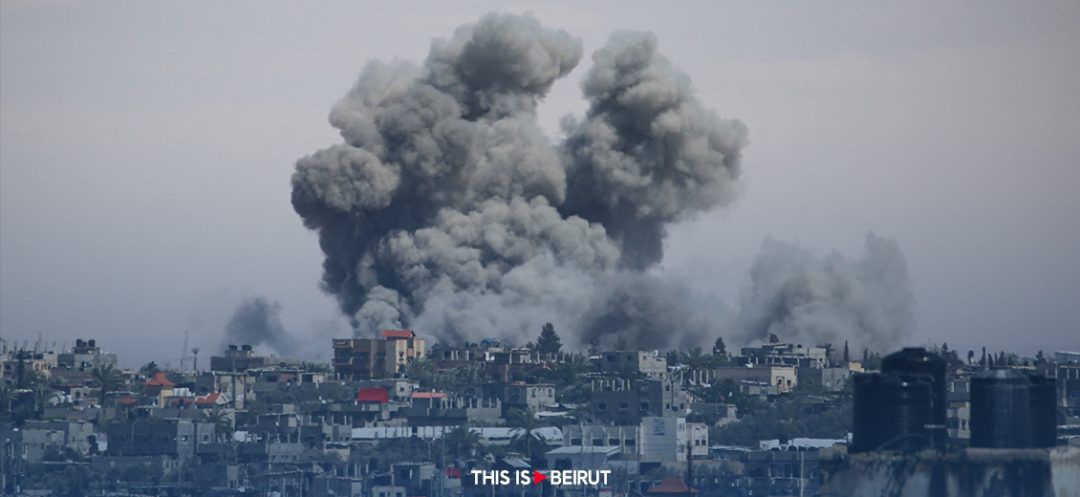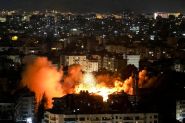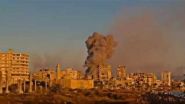- Home
- War in the Middle East
- Israel Seizes Rafah Crossing as Gaza Truce Talks Resume

©(Photo by AFP)
Israel deployed tanks into Rafah on Tuesday, in southern Gaza, taking control of the border crossing with Egypt, an action that the United Nations stated obstructed access to the crucial humanitarian route.
Israel sent tanks into Rafah in southern Gaza, seizing the border crossing with Egypt Tuesday, in an operation the United Nations said denied it access to the key humanitarian passage.
The thrust into the eastern sector of Rafah, packed with displaced civilians, came as negotiators and mediators met in Cairo in another effort to forge a hostage release and truce in the seven-month war.
A senior Hamas official, requesting anonymity, warned this would be Israel's "last chance" to free the estimated 128 captives still held in Gaza, including 36 officials say are dead.
Egypt's state-linked Al-Qahera News reported that mediators from Qatar, the United States and Egypt were meeting with a Hamas delegation.
It later reported that "all parties" including Israel had agreed to resume talks. Israeli Prime Minister Benjamin Netanyahu said earlier his country's delegation was already in Cairo.
Israel's close ally Washington said it was hopeful the two sides can "close the remaining gaps".
"Everybody's coming to the table," Kirby told reporters. "That's not insignificant."
Despite the Cairo talks, an AFP correspondent reported that Israeli strikes continued to pound east Rafah late Tuesday.
Israel's long-threatened Rafah operation began hours after Hamas announced late Monday it had accepted a truce proposal, prompting cheering crowds to take to the streets -- despite Israel saying it was "far" from plans it had previously agreed to.
Aid Crossing to Reopen
Army footage showed tanks taking "operational control" of the Palestinian side of the Rafah crossing, in a deployment that the military said had a "very limited scope against very specific targets".
UN humanitarian office spokesman Jens Laerke said Israel had denied it access to both Rafah and Kerem Shalom -- the other main aid crossing, on the border with Israel -- with only "one day of fuel available" inside Gaza.
The Pentagon meanwhile said the US military had completed construction of an aid pier off Gaza's coast, but weather conditions mean it is currently unsafe to move the two-part facility into place.
Three-Phase Truce
Egypt, which has a peace treaty with Israel, and Qatar, a US ally that also hosts Hamas leaders, have taken the lead in the talks.
Hamas said Monday it had told Egyptian and Qatari officials of its "approval of their proposal regarding a ceasefire".
Netanyahu's office called the proposal "far from Israel's essential demands", but the government would still send negotiators to Cairo.
Hamas member Khalil al-Hayya told the Qatar-based Al Jazeera news channel that the proposal agreed to by Hamas involved a three-phase truce.
It included a complete Israeli withdrawal from Gaza, the return of Palestinians displaced by the war and a hostage-prisoner exchange, with the goal of a "permanent ceasefire", he said.
International alarm has been building about the consequences of an Israeli ground invasion of Rafah, where the United Nations says 1.4 million people are sheltering.
EU foreign policy chief Josep Borrell said the attack on Rafah began despite European and US warnings, and it could cause many "civilian casualties".
US spokesman Kirby said Israel told Washington "that this operation last night was limited and designed to cut off Hamas's ability to smuggle weapons" into Gaza.
Egypt urged Israel to "exercise the utmost restraint", while the Organization for Islamic Cooperation condemned Israel's "criminal aggression".
Netanyahu had repeatedly vowed to send ground troops into Rafah regardless of any truce, saying Israel needs to root out remaining Hamas forces.
With AFP
Israel sent tanks into Rafah in southern Gaza, seizing the border crossing with Egypt Tuesday, in an operation the United Nations said denied it access to the key humanitarian passage.
The thrust into the eastern sector of Rafah, packed with displaced civilians, came as negotiators and mediators met in Cairo in another effort to forge a hostage release and truce in the seven-month war.
A senior Hamas official, requesting anonymity, warned this would be Israel's "last chance" to free the estimated 128 captives still held in Gaza, including 36 officials say are dead.
Egypt's state-linked Al-Qahera News reported that mediators from Qatar, the United States and Egypt were meeting with a Hamas delegation.
It later reported that "all parties" including Israel had agreed to resume talks. Israeli Prime Minister Benjamin Netanyahu said earlier his country's delegation was already in Cairo.
Israel's close ally Washington said it was hopeful the two sides can "close the remaining gaps".
"Everybody's coming to the table," Kirby told reporters. "That's not insignificant."
Despite the Cairo talks, an AFP correspondent reported that Israeli strikes continued to pound east Rafah late Tuesday.
Israel's long-threatened Rafah operation began hours after Hamas announced late Monday it had accepted a truce proposal, prompting cheering crowds to take to the streets -- despite Israel saying it was "far" from plans it had previously agreed to.
Aid Crossing to Reopen
Army footage showed tanks taking "operational control" of the Palestinian side of the Rafah crossing, in a deployment that the military said had a "very limited scope against very specific targets".
UN humanitarian office spokesman Jens Laerke said Israel had denied it access to both Rafah and Kerem Shalom -- the other main aid crossing, on the border with Israel -- with only "one day of fuel available" inside Gaza.
The Pentagon meanwhile said the US military had completed construction of an aid pier off Gaza's coast, but weather conditions mean it is currently unsafe to move the two-part facility into place.
Three-Phase Truce
Egypt, which has a peace treaty with Israel, and Qatar, a US ally that also hosts Hamas leaders, have taken the lead in the talks.
Hamas said Monday it had told Egyptian and Qatari officials of its "approval of their proposal regarding a ceasefire".
Netanyahu's office called the proposal "far from Israel's essential demands", but the government would still send negotiators to Cairo.
Hamas member Khalil al-Hayya told the Qatar-based Al Jazeera news channel that the proposal agreed to by Hamas involved a three-phase truce.
It included a complete Israeli withdrawal from Gaza, the return of Palestinians displaced by the war and a hostage-prisoner exchange, with the goal of a "permanent ceasefire", he said.
International alarm has been building about the consequences of an Israeli ground invasion of Rafah, where the United Nations says 1.4 million people are sheltering.
EU foreign policy chief Josep Borrell said the attack on Rafah began despite European and US warnings, and it could cause many "civilian casualties".
US spokesman Kirby said Israel told Washington "that this operation last night was limited and designed to cut off Hamas's ability to smuggle weapons" into Gaza.
Egypt urged Israel to "exercise the utmost restraint", while the Organization for Islamic Cooperation condemned Israel's "criminal aggression".
Netanyahu had repeatedly vowed to send ground troops into Rafah regardless of any truce, saying Israel needs to root out remaining Hamas forces.
With AFP
Read more



Comments